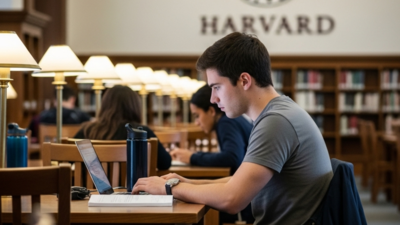ARTICLE AD BOX

Amid growing concerns over immigration scrutiny and digital privacy, Harvard University has issued a strong advisory for its international student community. The guidance was shared during a closed-door session hosted by Harvard's International Office and the university’s immigration support group at Harvard Law School.
It comes in the wake of a preliminary court injunction obtained by Harvard to block the Trump administration’s attempt to bar the university from enrolling foreign students.The advisory provides students with important recommendations on how to navigate the US immigration system more safely. From airport choices to electronic device security, here are six critical takeaways international students should consider before arriving in the United States.
Avoid Logan International Airport when possible
Students were advised to avoid entering the US through Boston’s Logan International Airport due to reported instances of heightened immigration scrutiny. While the university did not make an official directive, it suggested that students choose alternative points of entry such as John F. Kennedy International Airport in New York, Chicago O’Hare, or Los Angeles International Airport.Jason Corral, a staff attorney with Harvard Law School, highlighted that students from Iran, in particular, had reported facing increased questioning at Logan.
He acknowledged that there is not enough evidence to definitively rank one airport as safer than another, but noted that airports with more international traffic may result in smoother entry experiences.
Prepare for electronic device searches and social media reviews
The advisory placed significant emphasis on the risk of digital searches at US ports of entry. Students were informed that Customs and Border Protection (CBP) officers have the authority to examine electronic devices such as phones, laptops, and tablets.
In addition, the US State Department may review publicly accessible social media accounts as part of the visa assessment process.According to Harvard staff, content that is politically charged or critical of US policies may raise concerns among immigration officials. Students were cautioned that posts related to pro-Palestinian movements, antisemitism, or negative commentary about the United States could be flagged during screenings.
Avoid wiping devices before travel
Although it may seem safer to remove data from devices before traveling, Harvard warned against this approach. Cleaning or resetting a device could be interpreted as an attempt to conceal information and may prompt further questioning.Instead, students were advised to bring only essential devices, log out of unnecessary accounts, and avoid carrying personal content that could trigger concern. Harvard emphasized that discretion is important, but transparency is equally necessary.
Be aware of any prior legal encounters
Even minor past interactions with law enforcement can attract attention at the border. The advisory stated that students with prior arrests, citations, or legal proceedings should seek legal guidance before traveling and ensure they carry appropriate documentation.US immigration officers may treat infractions differently from authorities in a student’s home country. What may be considered trivial abroad can be viewed with greater seriousness by American officials.
Students from Iran and China should exercise extra caution
Given the ongoing geopolitical tensions, students from Iran and China were given more specific guidance. Those pursuing degrees in science, technology, engineering, mathematics, or artificial intelligence were urged to be especially careful while traveling.Although no single airport is officially designated as more secure, anecdotal reports suggest that JFK, Chicago O’Hare, and LAX may present fewer difficulties than Logan.
Harvard officials advised these students to keep their travel itineraries and academic materials clearly documented and readily accessible.
Harvard’s clash with the Trump administration
This advisory is part of a broader conflict between Harvard and the federal government. The Trump administration has targeted the university’s international student admissions, questioned its tax-exempt status, and withdrawn over 2.6 billion dollars in federal research funding.
While the administration initially cited antisemitism concerns, its criticism has since expanded to Harvard’s diversity policies and alleged ideological bias.Harvard’s recent legal win against the administration’s restrictions on foreign student enrollment is a temporary safeguard. The advisory reflects the university’s recognition that political headwinds continue to shape immigration policy in real time.
Vigilance is no longer optional
Harvard’s message to its international students is clear. Success in the classroom begins with a smooth entry into the country. Students must now take responsibility not only for their academic records but also for their online presence, legal histories, and travel logistics. In a climate where policy and perception intersect at the border, awareness and preparation are essential.



.png)
.png)
.png)
















 3 hours ago
3
3 hours ago
3









 English (US) ·
English (US) ·